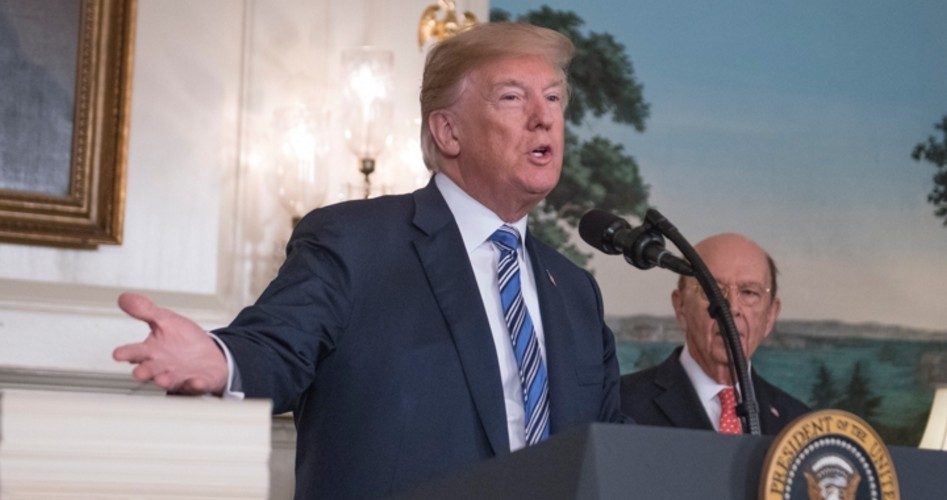
“To prevent the omnibus situation from ever happening again, I’m calling on Congress to give me a line-item veto for all government spending bills,” President Donald Trump declared in reaction to the monstrosity of a budget Congress sent him, known as an “omnibus” spending bill. Trump expressed reluctance when putting his signature on the bill, warning that he will not sign such legislation again.
An omnibus bill combines several spending bills into one. In this case, supporters argued that it was needed to avert a government shutdown. Members of Congress had little time to read through the bill before it was voted on by the House of Representatives and the Senate.
Trump should have vetoed this bill, and he is quite correct in saying that Congress included funding for “things that are really a wasted sum of money.”
Senator Ted Cruz (R-Texas) was one of those who wisely voted against the omnibus bill, citing some solid reasons. First, he noted that the $1.3 trillion spending bill was “2200 pages drafted by the Swamp in the dark of night,” adding that this legislation “will plunge our nation even deeper into debt.”
Cruz admitted that he could not cite all the problems with the bill, stating, “The disastrous elements of this bill are almost too numerous to list,” but he did list the funding for Planned Parenthood, which he characterized as “a corrupt organization whose horrifying abortion practices should preclude it from receiving taxpayer dollars.”
Cruz added of the omnibus bill, “It continues to fund sanctuary cities.… It fails to provide sufficient funds to properly secure our border, let alone build the wall that is necessary.… It tells federal agencies that they can spend taxpayer dollars to study the ‘causes’ of gun violence, a mandate that — make no mistake — will be abused by future liberal administrations to manufacture evidence to try to violate law-abiding citizens’ Second Amendment rights.”
Another problem with the bill cited by Cruz was that “It funds the Ex-Im Bank, a classic example of corporate welfare.”
While Cruz conceded that the bill did have some redeeming features, such as better military funding, and the blocking of a “bailout for ObamaCare,” he condemned the legislation overall as a “black-hole of federal spending and liberal priorities.”
With all of this, Trump’s desire to obtain a “line-item veto” is understandable; however, it would not be wise for Congress to give him this power.
Congress actually did pass the line-item veto in 1996, but the Supreme Court found the congressional delegation of power to the president to be unconstitutional in 1998 by a vote of 6-3. In Clinton v. City of New York, Justice John Paul Stevens argued that under the “Presentment Clause” of the Constitution, a president is required to approve or reject “whole legislation.” Stevens contended that the Line Item Veto Act essentially gave the president power to “amend” legislation, a power delegated only to Congress in Article I of the Constitution.
Stevens was joined by William Rehnquist, Anthony Kennedy, David Souter, Clarence Thomas, and Ruth Bader Ginsburg, while Stephen Breyer, Antonin Scalia, and Sandra Day O’Connor dissented.
Regardless of whether the line-item veto is a good idea, it is clearly unconstitutional, as Stevens argued. If Trump or anyone else wants the president to have a line-item veto, then supporters of such a proposal need to use Article V of the Constitution to amend the Constitution. As Justice Kennedy declared in 1998, “Failure of political will does not justify unconstitutional remedies.”
But is it a good idea? Should conservatives get behind an effort to amend the Constitution and give the president the power of the line-item veto?
No, if one believes the president of the United States already has too much power. Over the years, Congress had willingly surrendered its powers to declare war, to make trade deals (with such unconstitutional schemes as “fast-track authority”), to make treaties by allowing presidents to claim international agreements are “executive agreements” rather than negotiating treaties and seeking approval of the Senate as the Constitution requires, and by letting unelected federal bureaucrats effectively make laws.
It must also be understood that any power given to one president is a power that will be given to all future presidents.
Clearly, the desire to give a president a tool to control federal spending is tempting. But as Congressman Mickey Edwards wrote for the Washington Post in 1984, “Frustration is the emotion with which conservatives are most familiar, and in that frustration, desperate for progress in their war to change national priorities, conservatives are sometimes tempted to toss away the cornerstones of their political value system in exchange for small and temporary victories.”
Frustration leads many conservatives to favor solutions that can prove worse than the disease, e.g., a federal balanced budget amendment. But the problem is not so much wasteful spending as it is unconstitutional spending. Members of Congress violate the Constitution on a regular basis by voting for spending for which there is absolutely no authority in the Constitution.
Instead of just handing yet another power over to the president, Congress should reform the budget process. The principal reform needed is to require each agency of the federal behemoth to have its budget approved in a separate vote. No sane person can believe that Congress is doing its duty by lumping over a trillion dollars into one single vote.
The line-item veto would be a temporary “victory” that could prove to be yet another nail in the coffin of constitutional government.
Photo: AP Images



